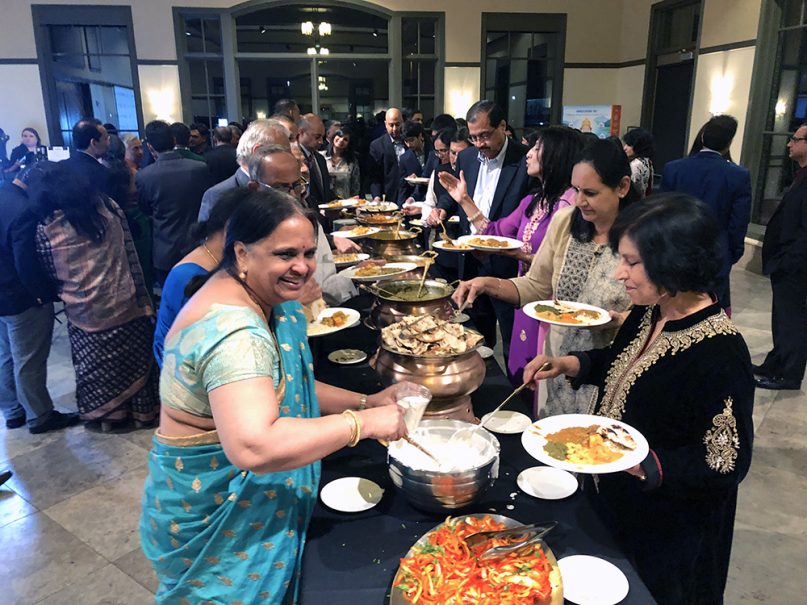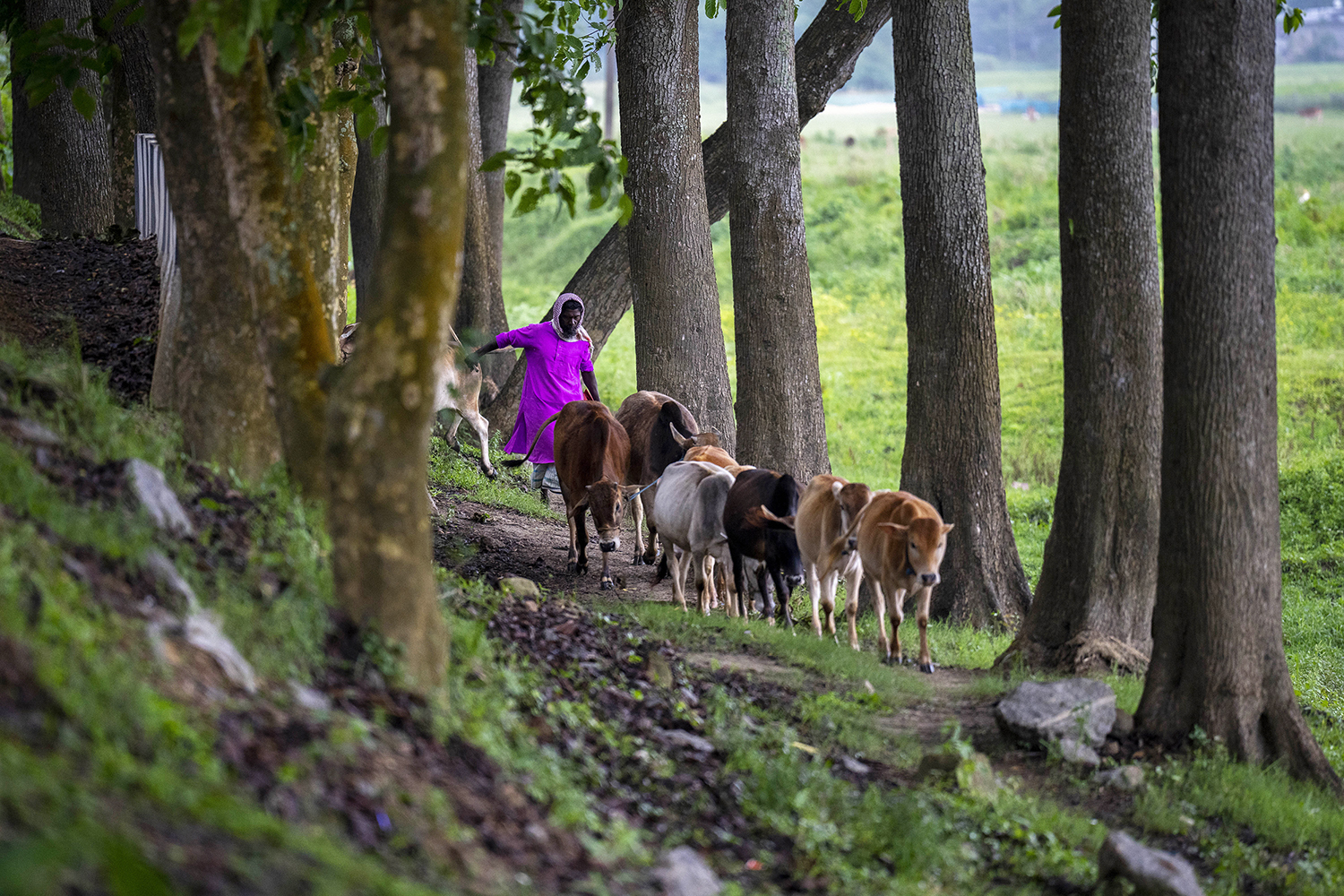(RNS) — Animal rights activists and ecologically concerned citizens may have led the charge into veganism — a lifestyle that continues to gain prominence for its sustainability — but more and more Hindus are adopting modern ideas about plant-based diets to the ancient principle of ahimsa, or nonviolence against all living beings.
“For me, being vegan was the best option to have the least carbon footprint,” said Karthik Ramkrishnan, a construction manager who moved from India, the world’s most vegetarian-friendly nation, to the East Coast in 2009. “And spiritually speaking, I didn’t want my existence to be dependent on any other species.”
Pew Research Center data from 2016 shows that some 44% of Hindus in India say they are vegetarian and that Hindus with higher levels of religious observance are more likely to be vegetarian. Of Indians who do eat meat, which included eggs in the survey, many said they have at least some restrictions on their meat-eating, abstaining on certain holy days or from certain kinds of meat.
The survey also found that most Indian Hindus say a person who eats beef cannot be Hindu. Cows are revered for their connection with Lord Krishna. Many small farmers in India own cattle for their family’s daily dairy supply, and the presence of gaushalas, or protective shelters for stray cows, is common throughout the country.
But India is nonetheless a thriving market for both cow meat and buffalo meat, referred to as carabeef, and leather. More than 80 million farms contribute as well to India’s dairy industry — one of the largest and fastest-growing in the world.
“Living in this commercial world, people are disconnected to where their food is coming from,” said Ramkrishnan. “It has taken away any connection that humans had with animals. So they don’t understand the significance of their lifestyle.”
The worst producers in the dairy industry, advocates like Ramkrishnan say, can unduly harm cows. “We are separating these calves from these mothers, because that milk is for those calves,” said Nidhi Bansal, a plant-based nutritionist in Chicago.
Bansal, a lifestyle coach, is the founder of Plant Based Indian Living, a website dedicated to vegan, oil-free recipes for common Indian dishes. Bansal initially turned to the lifestyle for health reasons: Diabetes, heart conditions, high cholesterol and high blood pressure ran in both her and her husband’s families.
“Dairy is ingrained in our blood,” said Bansal, who grew up vegetarian. “Our cooking is loaded with oil and ghee (clarified butter). People could not believe that you could cook food, Indian food especially, without oil.”
In ayurveda, the ancient scientific wisdom that stems from early Vedic Hinduism, meat is considered tamsic: heavy to digest and to be eaten sparingly, if at all. But dairy products such as milk and ghee are lauded for having unique nutritional values, providing ojas, or balance, to the senses and tissues.
Roshni Sanghvi, a nutritionist, insists the myths surrounding dairy in India must be dismantled. Instead of contributing to strong bones and joints, she claims, milk can harm your gut and lead to more diseases in the long term.
“When I started, I was the only one,” said Sanghvi, who lives in Bangalore, in southern India. “But veganism has grown so much in the fitness and aesthetic industries. You see a lot of athletes choosing to go mainly plant-based just because it improves their performance.”
Sanghvi, who owns a popular disease-reversal coaching program, was the first vegan competitive bodybuilder in India. A Hindu, she notes that some of her fellow religionists, including Hindu leaders, have accepted plant-based food for health reasons but still turn a blind eye to harmful factory dairy farming practices.
“I would be very careful in terms of communicating with clients with regard to why they need to stop dairy,” said Sanghvi. “I choose to stick to the health reasons. The moment I bring ethics in, people get defensive.”
Both Bansal and Sanghvi were raised in Jain families — a religion with the highest percentage of vegetarians in India. For Jains, the consumption of roots and tubers — potatoes, garlic and onions — is banned to prevent injuring small insects and microorganisms in harvesting.
But both say their families were shocked when they told them about their vegan lifestyles, worried the women would not get enough calcium or protein. Bansal says her friends stopped inviting her out, concerned about what she would eat.
“When you hear the word plant-based, you think it’s plants only,” she said. “They think, ‘How are we gonna survive just eating salads and fruit?'”
An influx of plant-based meat, such as the popular Impossible or Beyond Meat, has offered a new way of being vegetarian and vegan. The latest trend in lab-grown meat, made from the cultured cells of animals, is still being considered by religious authorities as to whether it is permissible under dietary laws or not.
Sanghvi says she will likely never try these mock meats, as they are too similar to the texture and smell of real meat. “I’m very grossed out by it,” she said. “I’m not even comfortable with mushrooms, because it wasn’t a staple part of our diet growing up.”
But for some Hindus, fake meat has been the answer to help a transition from nonvegetarianism to vegetarianism.

Conversations around lab-grown meat continue to spread around Hindu tables as followers determine what kinds of beef are and aren’t allowed in their faith. Photo by Alexander Fox/Pixabay via Creative Commons
“I like the idea of having those things available to me if I ever feel like eating them,” said Rhea Shewakramani, a New Yorker who chose to go vegetarian during the COVID-19 pandemic. “For me, it’s entirely different — you’re still eating something vegetarian that just tastes like meat.”
Shewakramani, who works in the beauty industry, said she made the switch as she learned more about the global impact of meat production on the world. In the years since, as she has pushed deeper into her faith, she has also found religious reasons to stick with vegetarianism.
“Having this belief of nonattachment or vairagya, with the food we eat, it’s the biggest attachment we have in our lives,” said Shewakramani. “I had to realize that meat, or the food I eat, is not directly linked to the happiness I experience.”
Shewakramani, who grew up in a meat-eating Hindu family, said carnivorism used to be a big part of her personality. Despite having to quit some of her favorite foods, such as sushi, she said going vegetarian was the best decision she could’ve made.
“Letting go of things like that trickled down into other aspects of my life,” said Shewakramani, who also quit drinking her beloved Coca-Cola. “I became more particular about what I choose to eat and how I nourish myself. It brought some discipline into my life.”
Across the spectrum of vegetarians and vegans, many agree the options have become increasingly accessible. Ramkrishnan, for instance, uses vegan ghee and vegan yogurt in his traditional Indian recipes.
But when attending temple services, which usually end in the giving of prasadam, or offering, Ramkrishnan must say no to the milk-based sweets that Hindus know and love. “It’s a difficult position to be in,” he said.
Now, he hosts dinner parties and vegan meet-ups across New York City, an effort he began a few years back to help others along their journey to veganism.
“Indians consume a lot of dairy,” said Ramkrishnan. “It’s in the culture, it’s part of the tradition and part of everything we do. It is going to be very hard to make that transition.”






